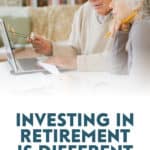Investing IN Retirement is Different than Investing FOR Retirement

I just got back from speaking to a group of industry professionals (Registered Deposit Brokers Association –RDBA) about how investing IN retirement is different than investing FOR retirement.
I think investing FOR retirement is a well-covered topic. This makes sense because the majority of Canadians are still not retired and still planning for retirement. Most of the articles and books and magazines are geared to investing FOR retirement but there is not as much on the topic of investing IN retirement.
I think things are about to change! Investing IN retirement is going to become a bigger and bigger deal – a huge deal! It will represent the future because of a group of people known as the Baby Boomers. The baby boomers have changed social and economic patterns ever since the day they were born. The first wave of baby boomers turned 60 in 2006. For the next 15 years, all the boomers are getting ready to retire and they will begin to bring massive changes to the field of retirement and investment planning. It’s already started.
Investing IN Retirement is Different
Retirement is a time when we begin to shift our thinking from saving to spending. That’s not always easy to do, especially for good savers. I’ve always said that it’s difficult for savers to become spenders overnight just like it’s tough for spenders to become savers overnight. Habits are tough to break – both the good habits and the bad habits. Retirees who do not spend their money in retirement can also lead to unintentional outcomes such as a dying with too much money. Many retirees don’t realize that higher returns can sometimes mean more tax in the future. Their focus should be shifted to estate planning.
That means we would shift our investment mindset from growth to income. Instead of growing capital we would be looking to preserve or even spend capital. Although higher returns on investments is the goal of every investor, regardless of what stage of life they are in, I would argue that through the course of retirement, returns become less important than other issues like simplicity of managing money, control over income, personal health, and quality of life become more important. Investors, who place too much emphasis on return and little or no emphasis on risk of loss, can get hurt when the market changes.
In retirement, portfolios should move from pre-authorized chequing plans (PACs) (where funds are transferred from personal accounts to investments accounts) to Systematic Withdrawal Plans (SWPs) (where the opposite happens cash flow comes to your operating account from your investments on a planned basis). To achieve this, there should also be a shift in thinking about the need for higher returns in order to manage risk. This is a critical change to be aware of because the math that once worked for you with dollar cost averaging now works against you.
The bottom line is there is a difference between pre-retirement investing and post retirement investing. As a result, retirees need to re-evaluate their investment portfolios the closer they get to retirement. I suggest that people who are three to 5 years from retirement need to get serious about it and start making sure their portfolios are positioned so there are in control over their retirement plans. Sometimes this period has been labeled the retirement risk zone. If pre-retirees don’t take the time to review their portfolio prior to retirement, they may join the thousands of people who have delayed, cut back or gone back to work in their retirement.


Comments
I am sure anyone who planned to retirme in early 2009 can tell you all about the importance of reducing risk leading up to retirement. I always say take the least amount of risk possible to reach your goal, if you are 5 years or less from retirement and are planning on using your saving during the first part of your retirement for income then you need to limit your exposure to equities, or have a back up plan should the markets tank.
Good post. I label this as moving from being an accumulator to being a decumulator. People think that because they were on autopilot pilot pretty much in the accumulation stage they can reverse the process in the distribution stage. This is dangerous because dollar cost averaging which was beneficial in the build up can be harmful when drawing down the nest egg.
You are right to draw attention to the drawdown stage ahead of time. The fact of the matter is that most of us have been put into this situation where we have to take risk to achieve the retirement we want and the key is intelligently managing that risk. You are exactly right in arguing that much more attention needs to be paid in this area. Again good post.
Here’s a short piece I wrote on it:
http://rwinvesting.blogspot.com/2010/06/are-you-accumulator-or-decumulator.html
You may want to get Insurance cover if you know that you are the only source of income for your family. There could be several reasons for you to get a life Insurance cover. Your loan/ mortgage payments, your wife/ spouse and children’s, your business, etc these are some reasons why people opt for life insurance. Unless you have a valid reason to insure your life, don’t do so.